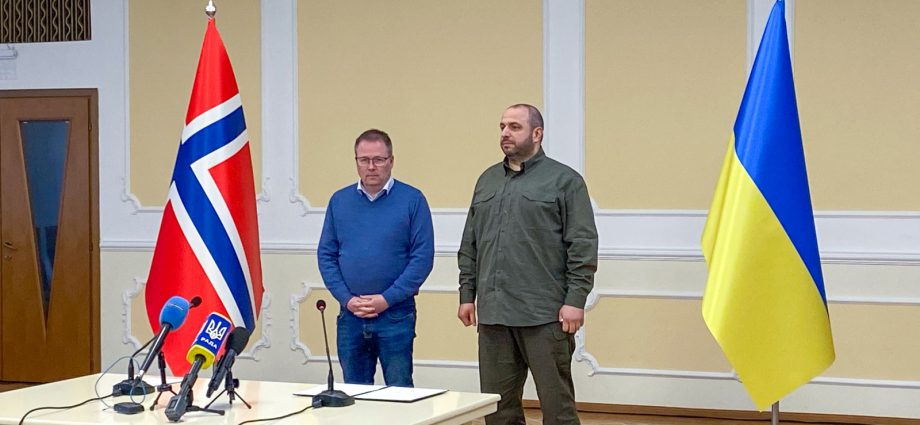Norwegian minister of defence, Bjørn Arild Gram and Ukraine minister of defence, Rustem Umerov. (Photo by: Eystein Kvarving)
Minister of Defence Bjørn Arild Gram visited the Ukrainian port city of Odesa a few days ago. During his visit, he announced that Norway will increase support for Ukraine’s air force with an additional contribution of up to NOK 1.3 billion, which will fund, among other things, the procurement of weapons and spare parts for F-16 aircraft.
The contribution is made through the American JUMPSTART mechanism.
Developing a Ukrainian air defence is one of the government’s priority areas for military support to Ukraine. Norway will donate six F-16s during 2024 and 2025 and has contributed to the training of Ukrainian pilots and support personnel in Denmark. The need for spare parts, weapons, and maintenance support for Ukraine’s F-16 fleet is significant.
With this contribution, Norway helps improve Ukraine’s air defence, in cooperation with the other participants in the Air Force Capability Coalition. The government will formally present the matter to the Storting (national parliament) later this autumn.
‘That Ukraine has quickly become capable of receiving and operating F-16s is impressive, yet the work isn’t finished, even though the first planes are now in place. A functional air defence requires not only aircrafts, but also weapons and regular maintenance. Funding is needed for the operation and upkeep of the donated planes. Both pilots and ground crew must be trained and educated, as we have supported in Denmark, and a comprehensive support system must be established. Norway will contribute to this,’ says Defence Minister Bjørn Arild Gram.
Increased Maritime Support
The United Kingdom and Norway are leading the Maritime Capability Coalition, aimed at strengthening Ukraine’s naval and coastal defence. Through this coalition, Norway and the UK coordinate the maritime support efforts of multiple countries for Ukraine.
The Norwegian government previously committed approximately NOK 750 million to initiatives under the coalition. This support has now been boosted by an additional NOK 50 million for the current year. Altogether, the support package includes training for Ukrainian forces, developing and managing an international training facility, and donations of various equipment types.
Norway’s recent contributions to the maritime sector include new donations:
‘This year, we are donating around 130 inflatable boats, with initial deliveries already made. Some of these boats come from the Armed Forces, while others are sourced from the civilian market. We are also supplying equipment to accompany the boats, including personal gear for the soldiers. Some of this equipment will be used in training small boat operators for river operations, an initiative we are supporting for the Ukrainian forces,’ says Gram.
Bilateral Meetings
The Defence Minister met with Ukrainian Defence Minister Rustem Umerov and Deputy Minister for Strategic Industries Anna Gvozdiar to discuss continued support for Ukraine and potential assistance for the Ukrainian defence industry. Gram also visited defence industry firms in Odesa.
‘Addressing Ukraine’s substantial needs requires significant investment and private sector engagement. The government is exploring ways to further support Ukrainian industry. Earlier this year, we facilitated the transfer of Norwegian defence technology to Ukraine and provided funding to support this initiative, enabling artillery shells developed by Nammo to be produced in Ukraine,’ the Defence Minister said.
Visit to Rehabilitation Centre
Gram also visited a Ukrainian rehabilitation centre for wounded soldiers. Norway aims to help strengthen Ukraine’s medical services and expand capacity at rehabilitation centres for Ukrainian soldiers. The first phase will focus on advisory support, training, and mentoring in treatment and rehabilitation, using multidisciplinary teams.
‘Ukraine is engaged in a demanding fight along the front line. Ensuring sufficient military personnel and equipment to sustain this effort over time remains critical. Caring for injured or ill soldiers is a central part of this effort,’ says Gram.
This support is provided in partnership with allies and is part of NATO’s Capability and Support Programme for Ukraine, known as the NATO Comprehensive Assistance Package (NATO CAP).
